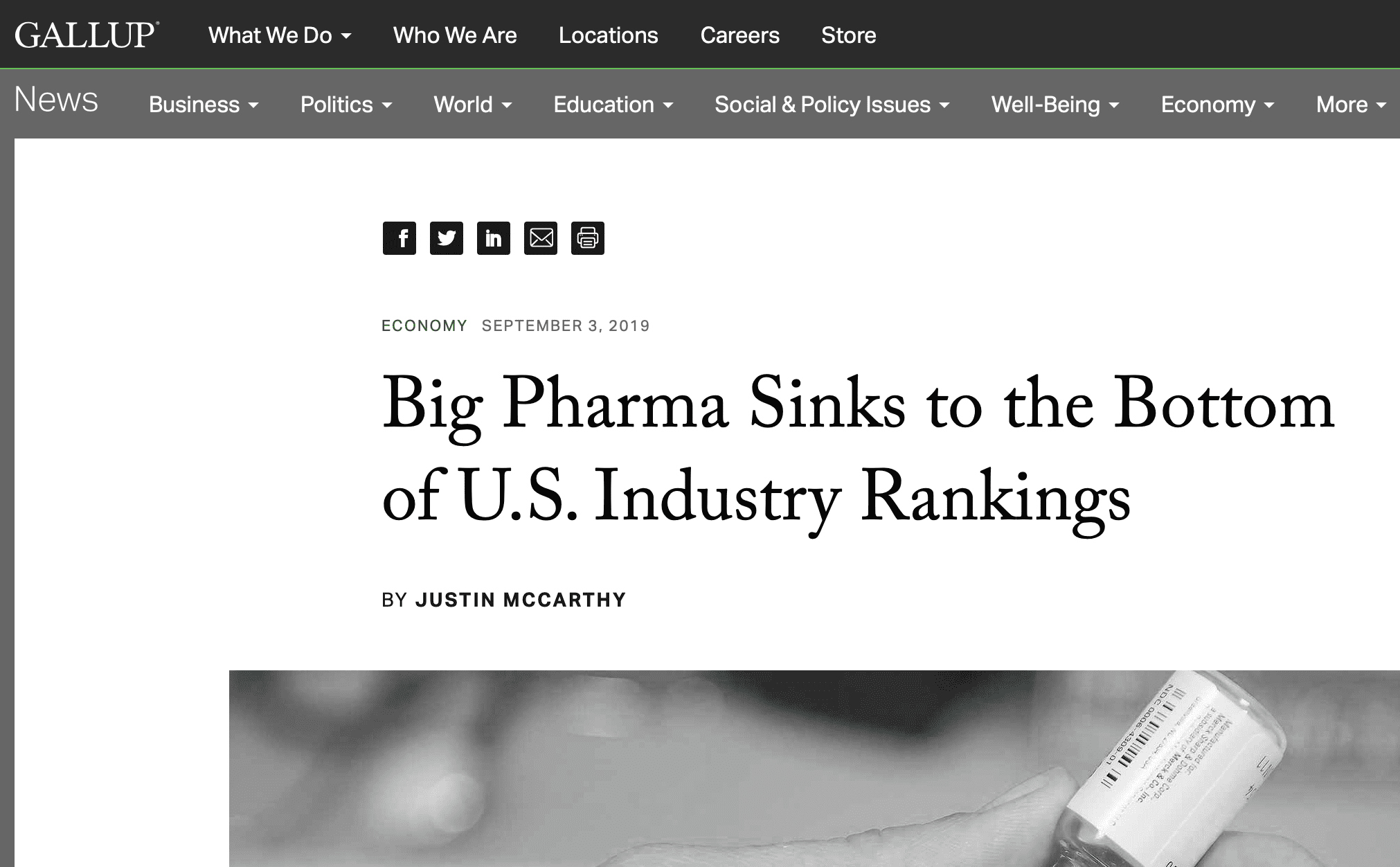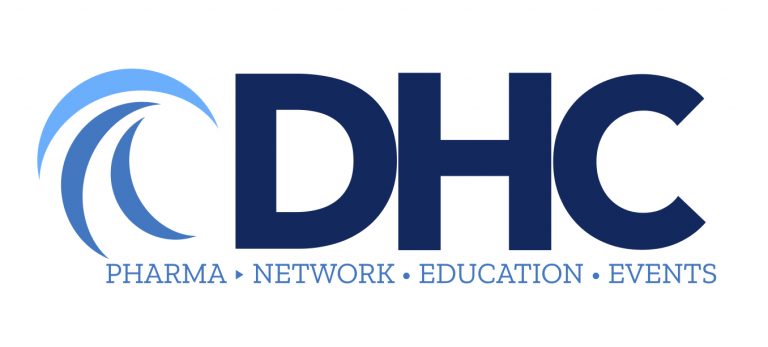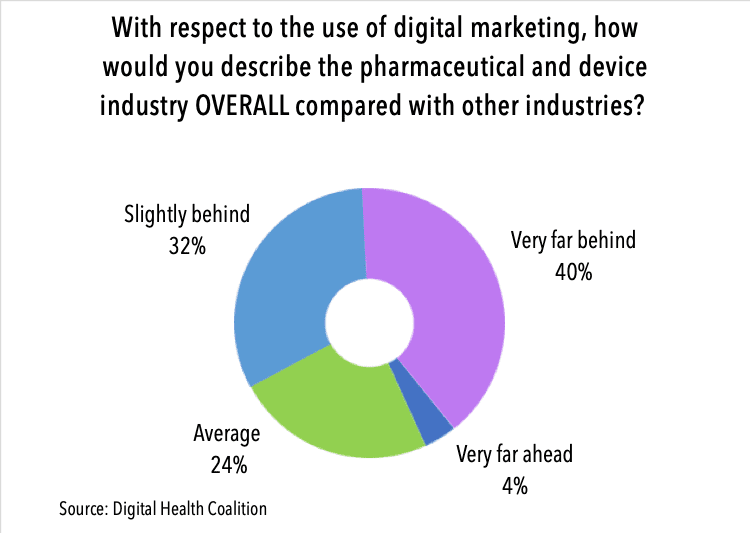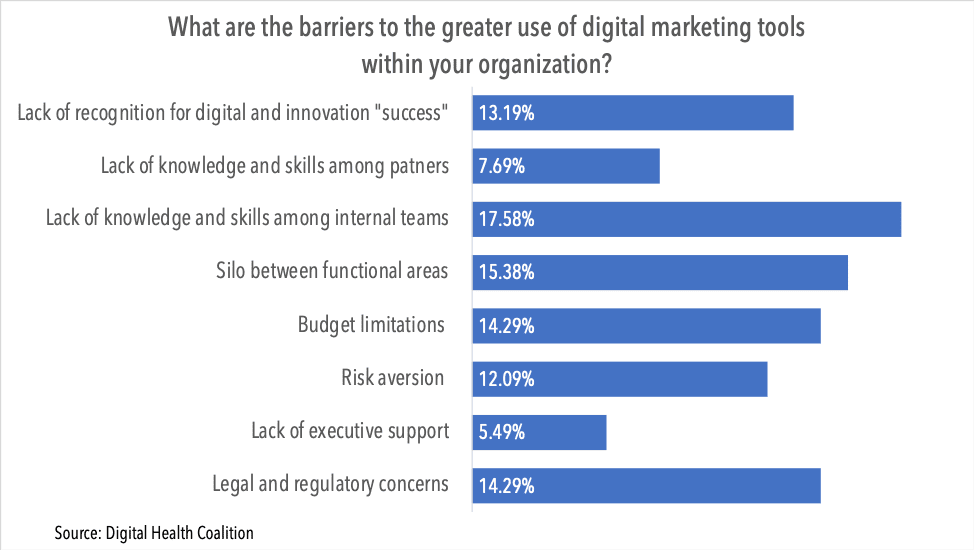Digital Health Coalition Newsletter - September 2019


FEATURED CONTENT: Pharma's Reputation and Patient-Centricity
Earlier this month, DHC co-founder Mark Bard sat down with MM&M Editor Marc Iskowitz for the MM&M podcast. We encourage you to check out the full podcast episode through your favorite podcast app, and we are offering here for our DHC readers an exclusive summary of their conversation and added data points.
Mark & Marc focused their discussion around a few related topics: pharma’s reputation in the public eye (brought to the forefront by the latest Gallup poll) and its impact on a marketer’s work around consumer experience, DHC data and analysis from a survey of pharma marketers on innovation opportunities and challenges, and a quick look at Mark Bard’s take on key trends for 2020.

Big Pharma Sinks to the Bottom of U.S. Industry Rankings
According to Gallup poll results which were released earlier this month, the pharmaceutical industry is now the most poorly regarded industry in Americans’ eyes, ranking last on a list of 25 industries that Gallup tests annually.
Americans are more than twice as likely to rate the pharmaceutical industry negatively (58%) as positively (27%), giving it a net-positive score of -31. To put these results into context, this is even worse than the public’s opinion on the Federal Government, which was formerly ranked last. What could be behind these unfavorable sentiments about the industry, and what solutions, if any, are within reach to improve pharma’s rating among public opinion?
“You look at it and you’ve really got to do a little bit of soul searching and say, ‘Why?’ Just strip it back to the very simple question — do your customers like you?”. He continues, “For any industry, whether you’re middle of the pack or last, if you’re below the average, you really do have to ask some of those tough questions of ‘Why do my customers feel this way?” – Mark Bard
The Pharma Approach to Customer Experience
“A lot of the auto companies, whether it’s a Porsche, or a Mercedes, they’re spending a lot to understand how to keep you, how to maintain that relationship over time,“ Bard says. Applying this approach in pharma, how can the customer experience be better understood to support the long-term relationship with the customer? Should the lifetime value of a patient taking a prescription be viewed differently than someone buying a car? “Porsche may have a 20, 30-year lifetime value for someone if they get them early enough. They can keep them around for four iterations of the car. What is the lifetime value of a customer in pharma?”
Benchmarking Pharma Digital
Another reason for pharma’s reputation is its perceived digital capabilities compared to other industries — in addition to the ever-present perceived legal and regulatory hurdles — was this idea of the lack of communication and coordination within and across the company.
“A lot of the companies [are] saying ‘We may have ideas, but this ability to share what’s working across the company is limited by the siloed thinking or siloed approach and how we make decisions internally’. If we can figure out how to take some of those insights we’ve learned from, and spread those as best practices, and share what we learned, we think that would help us at the organization level to do things that we may have necessarily not been embracing in the past,” explained Mark Bard.
Trends to Watch for in 2020
As the new year approaches, there are several trends the DHC believes will be gaining momentum in 2020 based on interviews with pharmaceutical companies. “The great thing is, we see what companies like Novartis are doing and from the C-suite down saying ‘We need to rethink the way we make decisions, how we use data, how we can be more nimble with what we do and how we take a much broader view of what the product is, what our service is,'” Bard notes. One standout from the DHC survey results was the need for innovation from the outside. The trend of bringing people from other industries into pharma so as to get a different thinking style is continuing to gain traction.
AI (Artificial Intelligence) also continues to be a point of interest in its application to the pharma industry. “The term “AI” will not be used in five to 10 years. “It’s just endemic. It’s part of the way we will do business. Think of a situation where we need computers to go through vast amounts of data to make decisions. We don’t debate the value of automation in manufacturing today. We’re not going to debate the value of AI in making marketing and customer experience decisions,” Bard explains.
Using radiology as an example in health care, AI has proven particularly useful in that field due to its superior pattern recognition and visual recognition abilities.
Finally, although less substantial relative to the other big trends in the industry, the DHC also expects VR (Virtual Reality) and AR (Augmented Reality) to continue growing in importance and relevance for pharma. The important distinction however, is to not just use AR/VR to retrofit previous advertising, but to instead really make the best use of the technology.
“There’s opportunities here to use AR and VR for what it does really well, if you’ve experienced VR in the outside world, you see the possibilities, and it’s amazing what you can do compared to just five and ten years ago. From an education, from a training perspective, it’s a huge opportunity if done right.” – Mark Bard
ADDITIONAL INSIGHTS FROM DHC PARTNERS

Outcome Health's New Patient Empathy Campaign
Via Outcome Health | Website →
Outcome Health, a healthcare innovation company focused on supporting patients, caregivers and healthcare providers at the point of care, launched In These Rooms — a bespoke campaign to transform the strategy of the industry from “point of care” to “moments of care™.” The campaign debuted at Digital Pharma East with a poignant, thought-provoking :90-second video depicting moments in waiting rooms and exam rooms with patients, caregivers and their physicians.
Read More Here →

The Chatbots Are Coming!
Via eyeforpharma | Website →
The mushrooming market is now disrupting pharma and the wider healthcare industry. As digital health becomes de rigueur, chatbots are leading the march. This article will explore what is happening on the ground and what the future might hold for this burgeoning area. DHC's Mark Bard lends his expertise in this look at how chatbots are emerging as a key trend.
Read More Here →

Customer Experience at the Retail Pharmacy
Via RxEdge | Website →
Nate Lucht, President & CEO of Rx EDGE examines the evolving roles that retail pharmacies and pharmacists play in today’s fastest growing sector of the healthcare market—specialty medicine. In this article, Nate gives readers insight on the challenges that specialty patients face before and after an official diagnosis, and the resources they rely on to carry them through their journey as a patient.
Read More Here →
DHC EVENTS COMING SOON

DHC East Coast Summit
October 8, 2019
NEW TIME: 10am - 3pm, includes lunch
Hosted by AstraZeneca
Request a Seat Today →
Limited availability, request a seat now.

DHC West Coast Summit
November 14, 2019
Hosted by Genentech
Request a Seat Today →
Mark your calendar now!
DHC PARTNERS IN THE NEWS
DHC CONTENT
FORREST KING ON CUSTOMER EXPERIENCE
DHC’s Advisory Board member Forrest King (JUICE Pharma) provides his perspective on the mandate for designing around the customer experience – whether that customer is a physician or a consumer. In this article, he shows how complicated human interactions with technology, natural language processing and advancing search algorithms are all coming together to improve the human-tech interaction. Forrest demonstrates how we will need to accept the challenge of putting the customer experience at the center of the process.

DHC’s Executive Director, Christine Franklin, recently interviewed Meghan Rivera, Vice President, Head of Women’s Health Sales and Marketing at AMAG Pharma. Meghan has been a member of the DHC Advisory Board for several years and a vocal advocate for innovation within digital pharma marketing. We sought out her perspective on the topic of patient-centricity, having watched her cultivate a culture at AMAG which genuinely prioritizes the patient.
Read Now →




